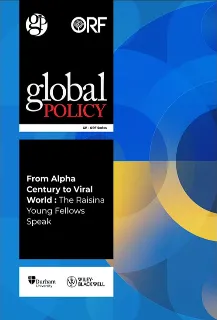The Observer Research Foundation (ORF) and ZEIT-Stiftung are delighted to publish this compilation of essays titled, From Alpha Century to Viral World: The Raisina Young Fellows Speak. This is a result of the intellectual generosity of and contributions by the Raisina Young Fellows, class of 2020. They joined us from across the globe in January last year for a ten-day policy workshop in New Delhi, participated at the Raisina Dialogue, and became part of our Young Fellows community at a time when the world was still oblivious to the pandemic that was already upon it.
This collection of essays has been scripted by the contributors while battling the COVID-19 pandemic, even as we were all grappling with its implications on our personal and professional lives and reconfiguring our future passions and future pursuits. This volume is motivated by the theme of Raisina Dialogue 2020, “Alpha Century”, and, in some ways, bookends the upcoming Raisina Dialogue 2021, titled, “#ViralWorld”. These thought-provoking 17 essays compel us to engage with four important spheres of our existence that seek urgent inquiry and dialogue—climate and sustainability, the new world order, democracy and pluralism, and technology and digital societies.
With its wide scope, this publication puts forth ideas and themes that would be central to the post-pandemic era. From the future of liberalism and democracy to the insidious and increasingly overwhelming presence of technology in our daily lives, these thought pieces were written by young leaders of today, and they provoke us to appreciate that these disruptions implicate and announce the demise of the extant international order and signal the urgent need for a novel format of multistakeholderism and, indeed, multilateralism. These essays look beyond the rhetoric, the popular trends and hashtags, and help agitate ideas that allow us to re-invest in a world that works for all—across politics, sustainability and international relations. As part of the Raisina Young Fellows 2020 programme, the Dean and Chair, Dr Shashi Tharoor and Dr Samir Saran, had presented and released their co-authored book, titled, The New World Disorder and the Indian Imperative, motivated by the ten years of discussions and debates hosted at this programme. The book had highlighted the extent of the disorder and the failure of the global international system to detect, respond, and manage multiple crises since its establishment post the Second World War. COVID-19 was to brutally corroborate many of the conclusions of the book by exposing the incapacity of the world to respond to the pandemic, the weaponisation of global trade, the selfish and perverse hunt for medical devices and solutions, and, indeed, more recently vaccine nationalism. Most importantly, it told us the story of the incapability of the international system to hold bad actors to account. The current state of affairs and its early resolution is not just an “Indian imperative”, as the book suggests, we require a new global imperative and universal ambition to find solutions to the formidable challenges and planet-wide inadequacies that confront humankind.
Can global institutions such as the World Health Organization (WHO) redeem themselves and honour their mandate of serving the global community? Can we partner beyond borders and find solutions and pathways that serve us all? Can we truly aspire to the ideal of one “global village”? Can we finally devise an approach for the greater good of all when it comes to our well-being and progress—from climate change to healthcare, from technology to infrastructure, from employment to social protection for every individual? We have a chance to respond to these posers now. Can one humanity emerge intact and victorious from a pandemic that has ravaged us as a collective?
But, most importantly, will the pandemic awaken us to the havoc ‘systemic risks’ pose? In October 2019, the Global Health Security Index (1) had projected the UK and US as the “most prepared countries” to tackle an epidemic or a pandemic; in 2020, we cruelly learnt reality differs from reports as both these countries lie in tatters. Similarly, our financial and credit systems prevent us from investing in climate mitigation efforts in the developing world. If we aim to preserve the integrity and viability of our planet, will we finally devise a system where climate risk supersedes the credit risk assessment of bankers in New York, Paris, and London as they invest in infrastructure for the future?
The pandemic sounded not only a wakeup call, but it also was an early warning siren for the doomsday clock as it ticks towards midnight (2). The young leaders who have contributed to this volume have written with the intention of appealing to our individual and collective conscience, and, indeed, call upon us to halt the march of this doomsday clock. As we enter this Decade of Action, we, as residents of planet earth, have this last window to turn back time and save millions from climate-induced disasters and destruction; unlike the pandemic, we will have no vaccine to redeem us then.
We, team ORF and team ZEIT-Stiftung, would like to acknowledge these important contributions made by Jan Hornát, Joanna Micah Eufemio, Franziska Fislage, Patrick Sandoval, Mitali Mukherjee, Utkarsh Amitabh, Nicolò Andreula, Krzysztof Michalski, Suneera Madhok, Ankai Xu, Nicholas Albertoni, Juan-Pablo Martinez-Molina Mercado, Lucas Maurer, Loes Debuysere, Nasim Pourghazian, Vali Golmohammadi, Sophie Briquetti, Mélissa Levaillant, and Cathleen Berger. It is our hope that this publication initiates conversations on these very important questions, guided by the adage of Per aspera, ad astra—through hardships to the stars. We are confident that the ideas contained in this compilation prove useful to students, practitioners, amateurs, aficionados, policy makers, and budding entrepreneurs alike to walk the motto Vasudhaiva Kutumbakam—the world is one family.
Read the full publication here.
The views expressed above belong to the author(s). ORF research and analyses now available on Telegram! Click here to access our curated content — blogs, longforms and interviews.

 PDF Download
PDF Download



 PREV
PREV

